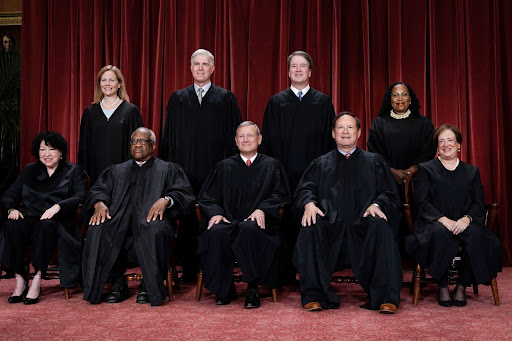
By Alanna Durkin Richer, Eric Tucker, and Michael Kunzelman, Associated Press
The Supreme Court’s ruling Monday, July 1st, in former President Donald Trump’s 2020 election interference case makes it all but certain that the Republican will not face trial in Washington ahead of the November election.
The Opinion
The court’s conservative majority said former presidents have absolute immunity from prosecution for official acts that fall within their “exclusive sphere of constitutional authority” and are presumptively entitled to immunity for all official acts. They do not enjoy immunity for unofficial, or private, actions.
The ruling means that special counsel Jack Smith cannot proceed with significant allegations in the indictment — or must at least defend their use in future proceedings before the trial judge.
The justices, for instance, wiped out Smith’s use of allegations that Trump tried to use the investigative power of the Justice Department to undo the election results, holding that his communications with agency officials is plainly protected from prosecution.
The justices sent the case back to U.S. District Judge Tanya Chutkan, who must now “carefully analyze” whether other allegations involve official conduct for which the president would be immune from prosecution.
Among the issues for further analysis is Trump’s relentless badgering of then-Vice President Mike Pence to not certify the electoral votes on Jan. 6, 2021. The justices said it was “ultimately the Government’s burden to rebut the presumption of immunity” in Trump’s interactions with Pence.
The Fake Electors Scheme
Unlike Trump’s interactions with the Justice Department, the justices said, “this alleged conduct cannot be neatly categorized as falling within a particular Presidential function. The necessary analysis is instead fact specific, requiring assessment of numerous alleged interactions with a wide variety of state officials and private persons.”
The Dissenters
The three liberal justices — Sonia Sotomayor, Elena Kagan and Ketanji Brown Jackson — sharply criticized the majority’s opinion in scathing dissents. Sotomayor gave a dramatic speech as she read her dissent from the bench, at times shaking her head and gritting her teeth as she said the conservative majority wrongly insulated the U.S. president as “a king above the law.”
The dissenting justices said the majority decision makes presidents immune from prosecution for acts such as ordering Navy seals to assassinate a political rival, organizing a military coup to hold onto power or accepting a bribe in exchange for a pardon.
“Even if these nightmare scenarios never play out, and I pray they never do, the damage has been done. The relationship between the President and the people he serves has shifted irrevocably. In every use of official power, the President is now a king above the law,” Sotomayor wrote.
In a separate dissenting opinion, Jackson said the majority’s ruling “breaks new and dangerous ground.”
“Stated simply: The Court has now declared for the first time in history that the most powerful official in the United States can (under circumstances yet to be fully determined) become a law unto himself,” Jackson wrote.

